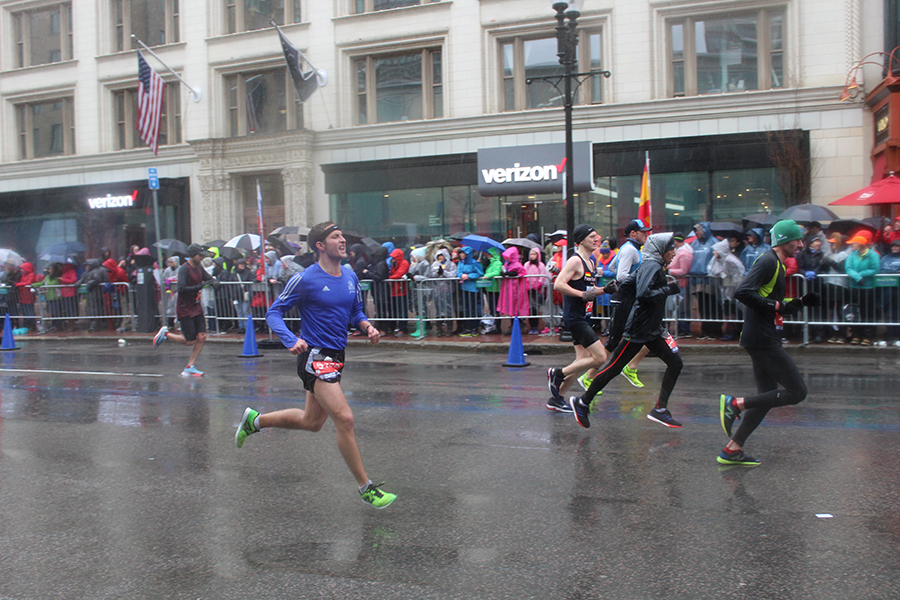
Stepping up to the challenge, runners at the Boston Marathon this year will be feeding malnourished children across the world via how many strides they take during the race.
In an effort to feed malnourished children through their Ready-to-Use Therapeutic Food packets, UNICEF Kid Power partnered with John Hancock, a longtime sponsor of the Boston Marathon, for this year’s race. The goal was to implement Kid Power, a program which encourages kids to be active by “converting” the number of steps they take into nutrition for the food insecure, and adapt it for the number of steps marathoners took on Monday.
With over 30,000 runners in Monday’s race, UNICEF estimates that over 1.65 billion steps will be taken, which will supply over 500 children with peanut-based paste packets, according to a press release from UNICEF.
Each runner’s steps will convert to around 2.3 packets, according to the release. The packets, also known as “miracle food,” which don’t need to be refrigerated or administered in a hospital, deliver nutrients that “help kids go from severely ill to healthy to growing over the course of 30 days.”
Matthew Bane, the Boston managing director of UNICEF, said the program aims to encourage children and their parents to get active and help others around the world gain access to proper nutrition. As the city sponsor, John Hancock will provide most of the funding this year for children participating from Boston Public Schools, Bane said.
Bane said about 4,200 kids are currently participating in the program, which runs until the end of May.
“I’ve ran the marathon twice and I ran it both times for Kid Power,” Bane said. “… knowing that you’re doing something for those kids is very helpful when you’re doing your training and you’re running on horrible days like [Monday], knowing that you are making an impact that’s beyond your own personal reasons for doing the race is really powerful.”
Greg Muse, 55, of Flower Mound, Texas, a participant in this year’s Boston Marathon, said UNICEF’s program will motivate him to run.
“Anything we can do to kind of take that and make it good for somebody else, I think that’s awesome,” Muse said. “… knowing that [this program is] out there and they’re going to be counting my steps essentially tomorrow, then maybe I’ll take a lot more steps.”
Megan Elias, director of the gastronomy program at Boston University, said this type of program, one that encourages runners to raise money for a cause, stems from when running became an activity average Americans participated in during the early 1970s.
“It then becomes a way to raise money for people who are seen as less fortunate, that the runners are kind of the privileged, that they’re privileged to be able to take time off to train and to train and then to raise money for people who are not in that kind of position,” Elias said.
Richard Wamai, a professor of Cultures, Societies and Global Studies at Northeastern University, said this is a great partnership between the runners and UNICEF, as nutrition is an issue for many countries, even the United States.
“I think every opportunity … to promote and champion the cause of [the] global nutritional conundrum is welcome, is positive,” Wamai said. “People need to know about it, people need to know that many, many children die every year.”
A marathon runner from Ottawa, Canada said those fortunate enough to run in a marathon should be giving back to those who need it.
“If you’re in a situation where you can train and where you’re not so exhausted at the end of the day from your regular life that you have extra energy to burn and extra calories to burn, that that means you’re in a position that very few people are lucky enough to be,” Mark Sutcliffe, 49, said.
The Boston Marathon is an ideal excuse to help those in need because many participants are already running for causes, Rose Arciero, 50, of Ontario, Canada, said. As a participant in this year’s race, she said running a marathon is a physical challenge in itself, and the addition of another “challenge” is a great way to up the incentive.
“It’s like I’m doing this, but somebody else can’t do it, so that’s why I think it’s fantastic because it gives inspiration to people that struggle to see, ‘well, maybe I can do this too one day with just a little bit of help,’” Arciero said.
























































































































